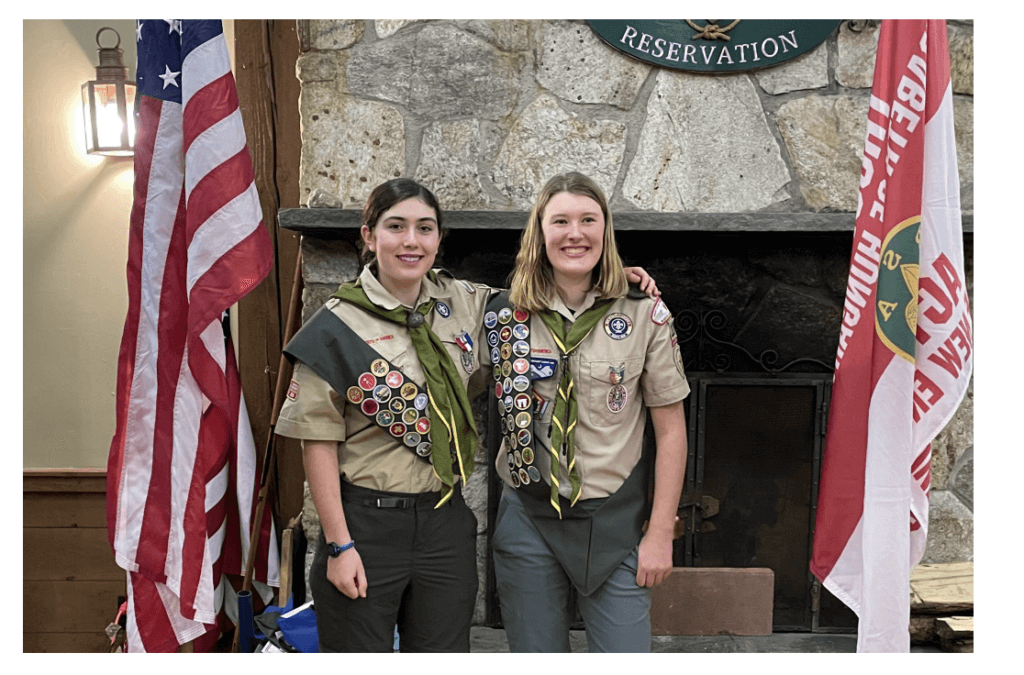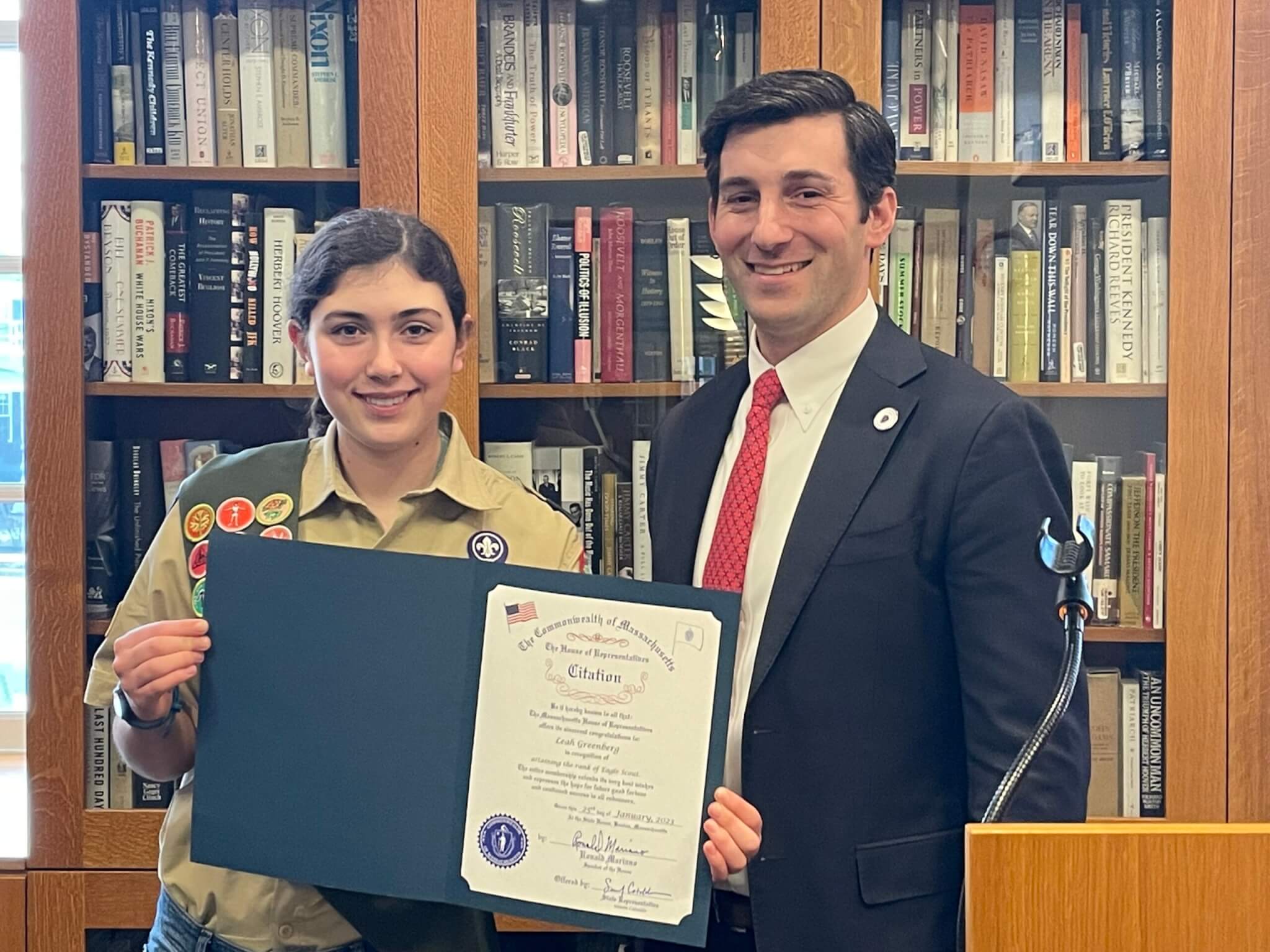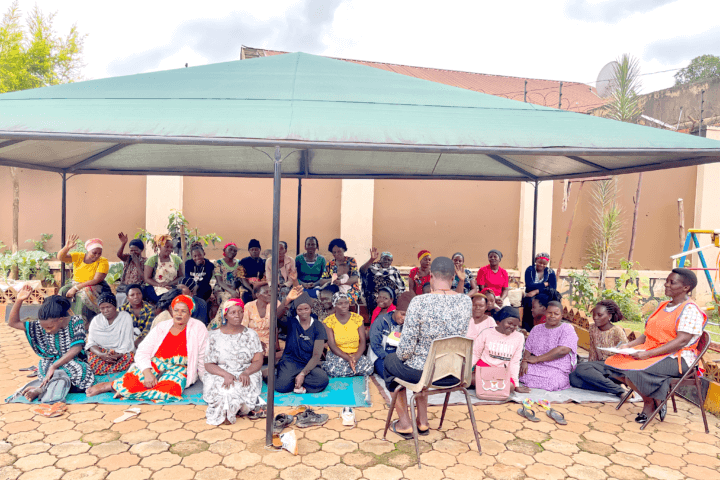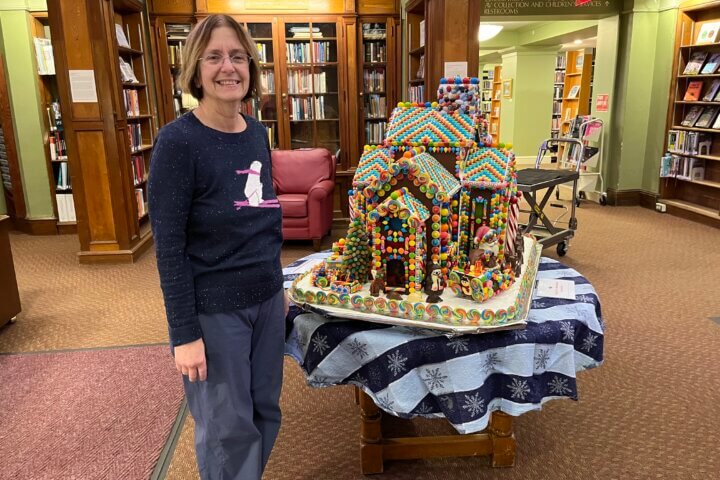Beneath a cold November night sky two years ago, Leah Greenberg realized she made the right decision.
“It was our first camping trip and we were camping outside without tents and it was 17 degrees,” the Concord-Carlisle High School recalled. “It was just awesome and a great bonding experience.”
Two months earlier Leah joined thousands of other girls around the country who took advantage of the opportunity to join Scouts USA, the organization formerly known as Boy Scouts of America. On Feb. 1, 2019, the nearly 120-year-old youth organization changed its name to accommodate its new policy of welcoming girls to its ranks.
This historical event not only offered girls like Leah more adventures — such as sleeping under an open sky on a bitter cold night — it cleared the path for them to become Eagle Scouts, its highest honor, which until two years ago, was only achieved by 5% of scouts, all of them boys.
Leah is not only a member of their prestigious rank, she is the first girl in Concord to achieve it. In November, she and Anna Campbell, Acton’s first female Eagle Scout, were recognized in the traditional Court of Honor ceremony. Last week, Rep. Simon Cataldo, D-14th Middlesex, recognized the girls for their outstanding achievements.

Scouting was not new to Leah, now 18. “I started as a Brownie, that was when I was very young,” she said. “It was not really a huge part of my life.”
The Girl Scout activities could not keep up with her passion for hiking, canoeing, fencing and extreme camping.
“I wanted to be a Boy Scout pretty much forever.” she said. Much of the appeal was hearing about all the fun her male cousin was having with his scout troop in New York. Those boys were always off on one exciting adventure or another. “I got to see all the cool adventures my cousin got to go on, and I started signing all the online petitions to let girls join Boy Scouts.”
Eight months after Scouts USA gave the green light, Leah was a member of Troop 12 in Acton, led by Scoutmasters John and Tori Campbell, Anna’s parents. At 30 girls, Troop 12 is one of the largest all-girl troops in the council. It is linked to Troop 32, which is all boys. The two troops regularly do things together, but sometimes they spin off on their own.
“It’s the same program, it just has girls in it,” said Leah, the only child of Brenda and Robert Grerenberg. “The uniforms are the same. Everything is 100 percent the same.”
Reaching the pinnacle of scouting is no easy task and one must be determined to make it. Candidates must first demonstrate they are self-reliant, responsible citizens focused on their communities, personal well-being and up for a challenge. Prerequisites include completing the first 21 merit badges, some specific to Eagle Scout rankings. Merit badges are awarded upon successful command of activities such as cooking, camping, First Aid, physical fitness and even dentistry.
Earning the “Citizenship in Community” badge was a haul, Leah said. “I had to learn all about Town Meeting and local government. That was definitely one of the tougher ones for me.”
The Eagle Scout Service Project wasn’t much of a picnic, either. To fulfill this requirement, scouts select a project for a nonprofit that is not related to scouting, usually something that benefits the community. Projects must meet the approval of a review board, along with a list of criteria including being completed before the scout’s 18th birthday.
Leah designed, built, installed and planted garden boxes for the First Parish Church in Concord. “I got lots of help,” she said. “But it was just one problem after another.” One debacle she did not foresee was transporting the large, finished products to the church.
“I learned a lot,” she said. “The planning was more work than the actual building and planting.”
A congregant and part of the religious education program when she was younger, Leah said she wanted to give back to First Parish. “Plus, I really enjoy working with kids,” she said. “I want to go into education.” She will study education at Tufts University this fall.
Traditionally, boys spend four to five years achieving the rank, yet since 2019, roughly 1,500 girls have become Eagle Scouts. Scouts BSA expedited the process so the newest enrollees could reach it before their 18th birthday. The smaller window, however, did not excuse them from meeting the qualifications. Fortunately, by the time they enrolled, they had documented leadership and adventure skills they could transfer to Scouts BSA.
“The girls who were 15 and 16 in 2019 had to be really organized and knock everything out,” said Tori Campbell, Anna’s mother and Scoutmaster of Troop 12. “And they had to demonstrate that they wanted this. It was intense.”
If a 2012 data-driven study from Baylor University is correct, Leah and Anna can expect a lifetime of dividends from the hundreds of dedicated hours of hard work, setbacks and restarts associated with reaching scouting’s highest ranks.
The study, “Merit Beyond the Badge,” compared adults who achieved Eagle Scout to scouts who did not reach Eagle Scout and boys who never participated in scouting. Their research showed Eagle Scouts:
- Exhibit higher levels of participation in a variety of health and recreational activities, such as regular exercise, outdoor recreation, attending plays and live theater, reading books, playing a musical instrument and visiting a local, state or national park;
- Show a greater connection to siblings, neighbors, religious community, friends, coworkers, formal and informal groups and a spiritual presence in nature
- Share a greater belief in duty to God, service to others, service to the community and leadership, such as donating money within the last month to a charity, reporting volunteer time, working with neighbors to address a problem or improve something, voting in the last presidential election and holding leadership positions at a workplace or local community;
- Engage in behaviors that are designed to enhance and protect the environment, such as being active groups focused on protecting the environment, avoiding the use of certain products that harm the environment and using less water in their households;
- Are committed to setting and achieving personal, professional, spiritual and financial goals;
- Show higher levels of planning and preparedness, such as having a disaster supply kit in their home and emergency supplies in their car;
- Indicate that they have built character traits related to work ethics, morality, tolerance and respect for diversity, such as always exceeding people’s expectations and doing what is right.
“There is no shortage of examples or anecdotal accounts that suggest Scouting produces better citizens, but now there is scientific evidence to confirm the prosocial benefits of Scouting or earning the rank of Eagle Scout,” Byron R. Johnson, Pd.D., the study’s principal investigator, told the Baylor University Media when the study was published.
The Baylor study, however, excludes girls. Campbell is proud of both Anna and Leah but is hesitant to say becoming an Eagle Scout is a shoe-in for college acceptances and successful career paths.
“My daughter dreams of going to the Air Force Academy and flying fighter jets,” said Campbell. Anna’s Eagle ranking may give her an edge over other applicants because it demonstrates qualities necessary for that career goal.
“Some schools are looking for leadership and athleticism because grades are not always enough,” she said. “As for the service academies, being an Eagle Scout is exactly what those schools are looking for.”
Campbell was never a Girl Scout, but its competitor, a Camp Fire Girl. “I was 12 when the council folded,” she said. She went on to earn a bachelor’s degree from West Point and reached the rank of Lt. Col., during tours in the Middle East and Bosnia.
Because Girl-Eagle Scouts are so new, she is not sure if they will receive the same recognition as boys going forward. “How does society see it?” she asked. “I have no idea, but scouting creates some incredibly effective leaders. These young women will be confident in areas where women aren’t expected to be confident.”
Campbell knows from experience. “There was this time, when no one expected me to be able to read a map,” she recalled. Yet, to the surprise of many male colleagues and subordinates, she could. “All of the young women who come through this program will deal with that.”
Leah is ready for the challenge. Now, as Senior Patrol Leader, she organizes camping trips, hikes and other other adventures, but she also wants to be part of Scouts USA’s evolution to becoming more inclusive. In her speech at the November ceremony, she highlighted the organization’s “complex past,” especially its hesitancy to welcome atheists, members of the LGBTQ community and women. As she said in her speech:
“I hope that by me, Anna, and all other girl-Eagle Scouts making it, we can make Scouts BSA just that much more open-minded, accepting, and a bit better than it was yesterday.”





